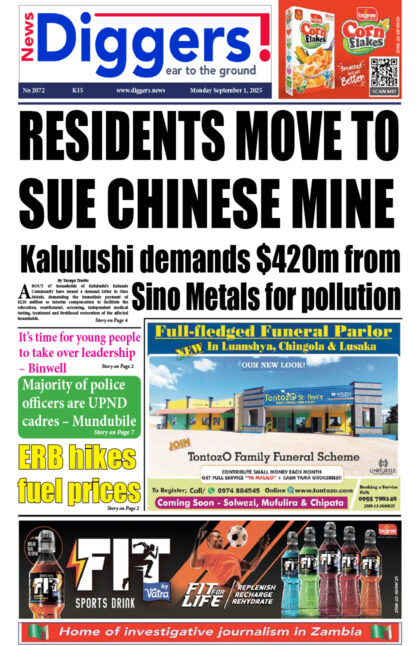Zesco says it will soon start installing new metre boxes which will regulate the usage of electricity in households to prevent consumers from abusing power after load shedding hours.
Speaking on Hot FM’s Frank on Hot, Tuesday, Zesco director distribution Jonah Sichalwe said the smart metering project would force consumers to stay within their consumption limits.
“One activity that is ongoing is the low power factor surcharge advances. Low power factor, this is to ensure that customers’ power factors are maintained at 092 or better towards one this also goes to assist customers with efficient utilization of power. One other thing we are doing on the demand side of business, we are contemplating introduction of smart metering. We have done a pilot project and things look good,” Sichalwe said.
“In this regard we will engage in what is called load limiting. For instance maybe you draw 30 amps, maybe we’ll limit you to 10 amps so that you do not go off so that the power it terms of limiting usage comes to you but if you exceed consumption beyond the 10 amps, then you will load shed yourself.”
And director strategy and corporate Patrick Mwila insisted that load shedding would have remained at four hours per day if consumers were not over utilizing electricity when they had it.
“There are two problems to this scenario from the supply side to the demand side. In this current scenario from the supply point, load shedding is the best way to go. From the demand side, we are saying our customers must engage in efficient use of electricity. Our customers must look at alternatives in terms of cooking,” Mwila said.
“If our customers can engage in those alternatives, the fuel will start building up in our dams and then we should be able to generate power going forward. If we were able, from the demand side, to live within the perimeter of the four hour (consumption), we would not even have needed to increase the load shedding, it would have remained four hours.”
Mwila explained what was delaying importation of power from Eskom, South Africa.
“The are two critical issues one: internally we have to agree on the mechanisms we have applied to the regulators on two occasions. One, we had applied for a tariff raise in February which discussion was put on suspension briefly and we also made an application which was very specific. So there are some legalities regarding the process of any tariff increase, we are a nation of laws. You might be aware that it is going through process, conversations are actually going on,” Mwila explained.
“We are entering into a commercial agreement so there are conditions precedent that must be fulfilled to satisfy the entity that is going supply us with that power. It is already in the public domain that we need US$22 Million per month. We have to find the money, we have no choice. This is a battle of trying to balance demand and supply and in trying to [do that], we can see that we are losing the battle. Demand is overcoming the supply.”
Mwila said importing of power was inevitable.
“Importing is inevitable. Paying that price of US$22 million is normal it is almost that we are paying to the independent power producers. It is not extraordinary, it is just that it is dollars, people are used to seeing the kwacha. That is the kind of price we pay to the independent power producers of that power,” said Mwila

























10 responses
Good idea
How much money is DRC AND MALAWI PAYING YOU FOR POWER YOU ARE SUPPLYING THEM
Zesco has never provided free power to clients, all the power clients use is paid for, so to say abuse of power by clients is defamation of character. Just find alternatives to hydro power to solve energy deficit in the country. Let’s have real engineers who can think outside the box.
This load shedding can’t be there if the government through zesco engaged the private sector. Last year a Belgian firm called Lengrade wanted to put up some solar fields in some parts of the country.
Eastern province had Msoro and Azele area in Katete but some people discouraged the investors of this project.we have the sun all year round so solar power is cheaper and always available
ZESCO should revise the tariffs in the high density area because people in the low density are subsidizing for them. Some people with good jobs are now living in these areas are are paying ridiculously low amounts for electricity
You telling me that a monopoly company who’s sole purpose is to generate power sell it and generate revenue through meters which is paid for by the customer using the service is going to restrict the usage of the product they make and this isn’t going to impact themselves…. Really
How can we honestly FAIL to have a stable electricity supply? Such a shame, I for one would NOT like to return back to Zambia.
How do you blame paying customers for your short comings in solving this problem? It’s taken you years to fix this power problem, and you do it now. Am sorry but Zesco you need to get serious and take responsibility for your short comings and lack of development.
Instead of investing in other sources of ENERGY like Coal Fired Power Plants, you are wasting money on these useless metres.In business when demand increases you don’t limit use of your product, you increase production, simple.Zesco needs to be PRIVATISED to end Loadshedding.
No vision zesco